Welcome to the Warcraft Book Club, where we all spend way too long reading into the deeper lore of a video game primarily about killing 10 of something so some elves will like you 250 points more. News broke this week that noted fan and author of several Warcraft books, Christie Golden will be working for Blizzard in some capacity. Now, because some say that if Blizzard ever announce something in a timely manner it will be the song sung to end the world, the exact details on what Ms. Golden will be working on are shrouded in secrecy with detailed fan research (wild guesses) pointing to her either; taking over from Chris Metzen as the new Story lead for Warcraft, Overwatch, and Starcraft, or leading story development on the new Blizzard IP that in all honesty is probably Half-Life 3 at this point. Well, that or she could be brought in to read Ben Brode stories in a soft voice so he will SODDING CALM DOWN.
But regardless of my nonsense, I thought that this news would be a good time for me to show off just how many video game tie-in books I’ve read (ok ‘show off’ is not the word but 'realise in terror' doesn’t have the same ring to it) and take a look back to arbitrarily list the best and worst of the WoW books released over the 13 years the game has been out.
As a disclaimer, I will keep these descriptions as spoiler-free as I can, although one or two of the books I may have to skip this rule on just so I can shout at exactly how stupid they are (oh you know THAT army is being mentioned) also with one or two exceptions, I will not be listing the books that take place within Warcraft 1-3, the film tie-ins, the mangas, Short Stories, and comic books, as this list will focus entirely on World of Warcraft (and one that concerns events you the player actually involve yourself in), the Chronicles are not featured here either.
Oh and Cycle of Hatred and Traveler won’t be on this list. No reason other than I haven’t had the chance to read them yet, I will update the list when I get around to finding a copy of either in audiobook form.
So that aside, now comes the rundown of the best and worst of the WoW book canon.
Night of the Dragon by Richard A. Knaak
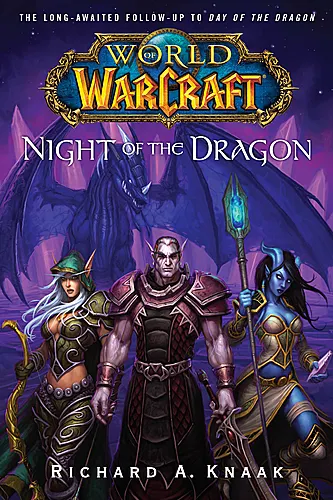
Yeah, we’re starting here, oh boy. Night of the Dragon is not just a bad book for a tie-in but a legitimately bad book in its own right. Based between The Burning Crusade and Wrath of the Lich King expansions, the book follows Vereesa Windrunner, the red dragon Krasus, and the Draenei Iridi as they hunt down what remains of the black Dragonflight and try and work out just what they are planning to do with the Outland-dwelling nether dragons. I know that SOUNDS like fun, but what unfolds is a stagnant trope filled and ludicrous 3 miles per hour rollercoaster ride that ends up making every interesting character boring and kills off the only mildly interesting original one.
The book is perhaps best known for having Knaak-favorite Rhonin take center stage and is at his most overpowered a complete Mary Sue. At one point he storms in to save his helpless wife (we will get back to Knaak and his handling of usually powerful female characters another time) with an army of raptors in tow. No, I am not kidding.
It’s a painful book to drudge through and one I’d avoid.
Stormrage by Richard A. Knaak
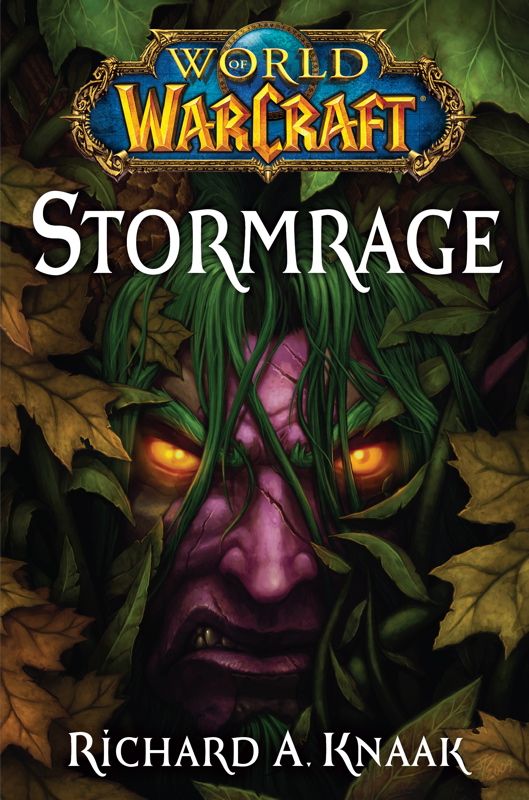
Compared to Night of the Dragon, Stormrage is The Lies of Locke Lamora. But taken on its own merit it's another sufferer of Knaak and his almost schizophrenic pacing problems with story elements going from fast to slow and then back and forth with all the grace and tact of a rocket tied to a water bison. Stormrage, rather than focus on the interesting Stormrage brother, focuses on the return of Malfurion and his war against the Nightmare of the Emerald Dream. Oh and Tyrande is there written, as usual for Knaak, as a sort of walking kidnapping victim which is slightly at odds with her basically being one of the most powerful and self-sufficient women in WoW lore (she’s basically a mix of Moses and the Mountain from Game of Thrones). Knaak has an... odd way of dealing with his female leads in these books. They either seem to be one-note screaming psychopaths or frail little mice that need saving.
Actually, there is one exception: Thura, an orc woman, is now the bearer of the enchanted wooden axe once owned by Broxigar (her uncle) from the War of the Ancients books and a part of the Saurfang bloodline. She is at least an interesting and noble orcish character, so it’s a great shame that Blizzard, who are now seemingly waking up to the idea of strong female leads, have so far sadly ignored.
Stormrage is not a really bad book but I can’t say I’d recommend it. It suffers from the usual bloat of Knaak and never really feels like it’s going anywhere.
War of the Ancients Trilogy by Richard A. Knaak
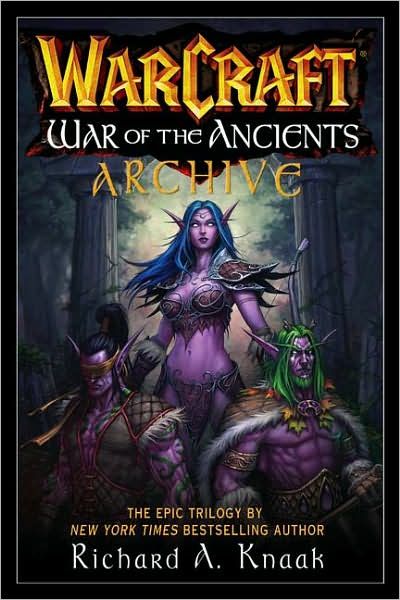
I will bundle these 3 books into one as everyone else tends to, and honestly, it's hard to tell them apart at times. The WotA books focuses on the war between the then-high elves and the first Legion invasion, leading eventually to the great sundering of Azeroth, the creation of the World Tree, and the origins of the night elves distaste of the ways of the arcane. Oh, and Rhonin and Krasus are there as well for some reason, alongside an actually interesting character in the Orc Broxigar, a character so interesting it's almost worth reading the books just to experience him.
The WotA books are… okay. Truth be told they feel oddly long for being by most trilogy standards quite short books, which can in part be down to just how much unnecessary bloat the books contain, while Brox’s inclusion adds yet more layers onto the brutal bravery and melancholy of the Orcs that took place in both the genocide of the Draenei and the invasion of Azeroth, the addition of Krasus and especially Rhonin feel very out of place and forced.
The books feel like a slog to get through and I can’t say I’d really recommend them.
Thrall: Twilight of the Aspects by Christine Golden
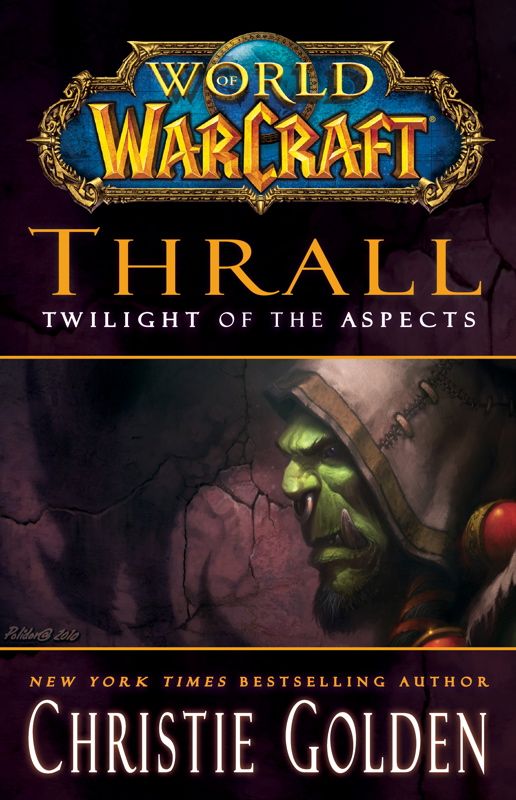
This book at times feels like it has no idea quite what it’s supposed to be doing so tries to do everything at the same time, trying in part to be a slow paced character piece and a grand fantasy sweep at the same time, but never quite grasping either. It’s time for Thrall to come to terms with what he is and what his destiny is to be while helping the remaining aspects defeat the dragon equivalent of a hydra and Voltron before it destroys the something something etc etc.
It’s not a bad book by any means, but for one with so much going on, aside from one very moving scene it doesn't really leave anything for the memory to stick onto, has much light and spectacle oddly squished together with slow introspective moments that end up feeling rather fake plastic.
Still, this is the first book of this list I’d actually suggest fans read, it has its faults but the deeper look at the aspects and their part in history are worthwhile, plus it features Aggra who always improves anything she is in.
The Shattering: Prelude to Cataclysm by Christine Golden
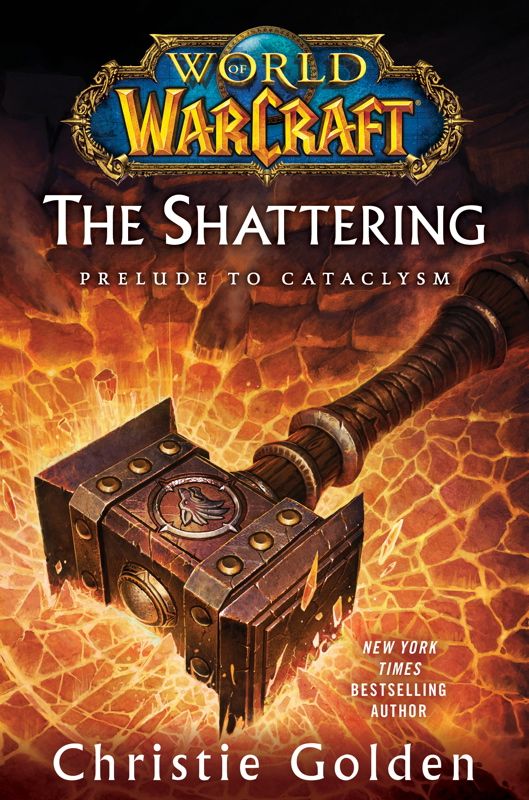
Setting up the massive political changes within the Horde and Alliance prior to Cataclysm, the Shattering focuses on the handover of power from Warchief Thrall to Garrosh, as well as the return of the Dark Iron Dwarves just after the apparent death of the King of Ironforge. The Shattering is still not quite the best of the WoW books, suffering from pacing issues and far too much explaining of its own lore and canon, something that to be fair many of the WoW books deal with at times, but on the whole it’s still an enjoyable romp through Thrall's journey at a time when we weren’t sick of hearing about it, as well as doing as much as any other books to build up Baine Bloodhoof who until this point was barely a footnote.
Arthas: Rise of the Lich King by Christine Golden
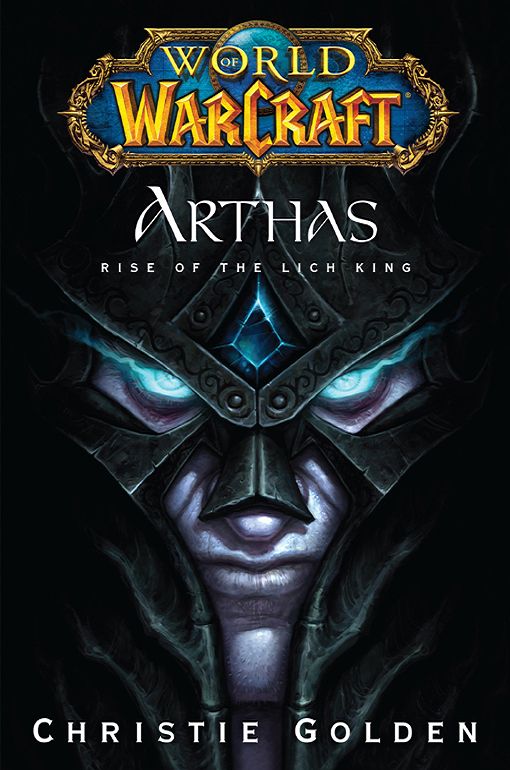
For such an important book, Arthas ends up feeling like one of the least important to read of the Warcraft canon. While building Arthas up as even more of a tragic monster, it doesn’t really do anything that any of the in-game quest chains or instances don’t already do within the Wrath of the Lich King expansion.
Still, it’s a well-paced book with good world building I’d still recommend to fans of the game and especially Wrath lore.
Wolfheart by Richard A. Knaak
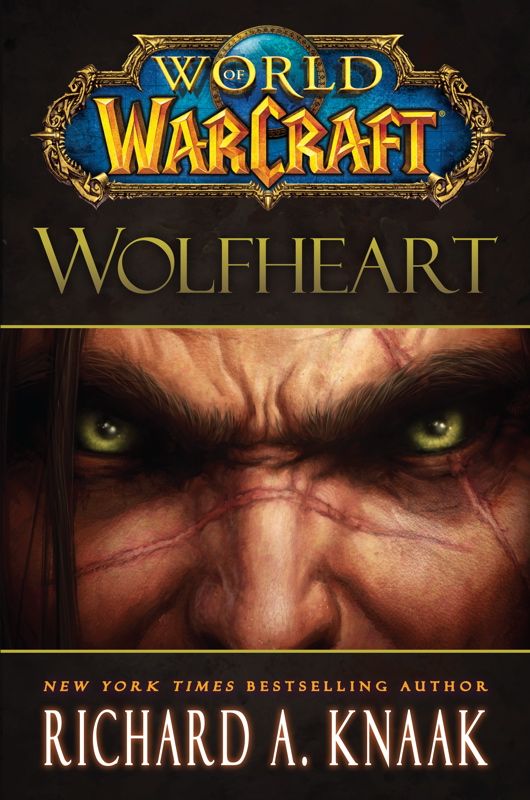
Most of this book should have been in-game content. There, I said it. Dealing with the Horde invasion of the night elven lands, as well as Malfurion and Tyrande attempting to allow the Gilnean Worgen entry into the Alliance and the fallout that comes mostly from Varian Wrynn hating Genn Greymane with a burning passion. Starting relatively small in scale as a seeming political drama mixed with a murder mystery, Wolfheart builds slowly and, finally for Knaak, great pacing into an epic Tolkienesque battle of the Horde and Alliance. The smaller threads of the stories are really where this one shines, mind you, from the personal battles of the King to the changing face of the night elven culture and the backlash against it. While at times it suffers from the side plots being much more interesting than the main one, it’s still an enjoyable read and one I’d recommend.
While at times it suffers from the side plots being much more interesting than the main one, it’s still an enjoyable read and one I’d recommend.
Jaina Proudmoore: Tides of War by Christie Golden
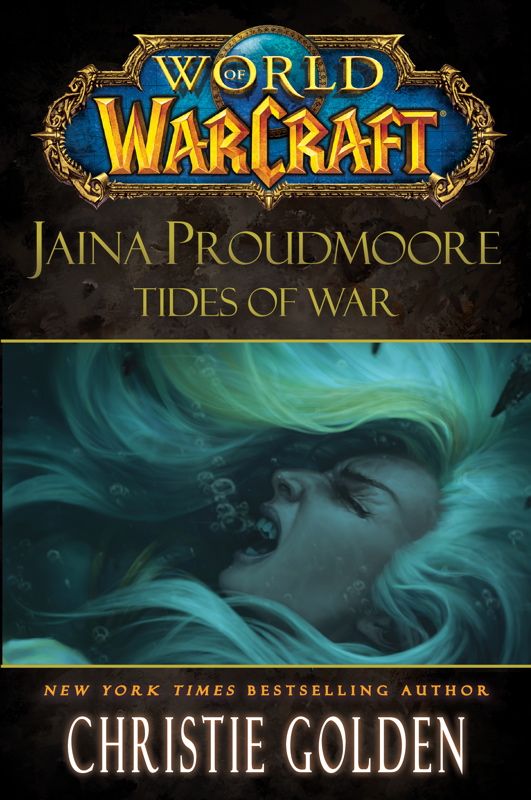
She’s not a dreadlord, she’s just MAD. Tides of War is the forerunner to Mists of Pandaria that players who for some reason enjoyed that expansion scenario will know the main plotline all too well. I will be as vague as I can for the few of you who don’t know what happened, but the book manages a good job of switching the swing of momentum and themes as the book goes on, going from epic war story to political intrigue to a charming love story until it settles on “what if the Bride from Kill Bill was also a walking WMD” for its final act, the book manages these usually drastic switches in tone and pacing with the kind of aplomb that Twilight of the Aspects lacked.
Illidan by William King
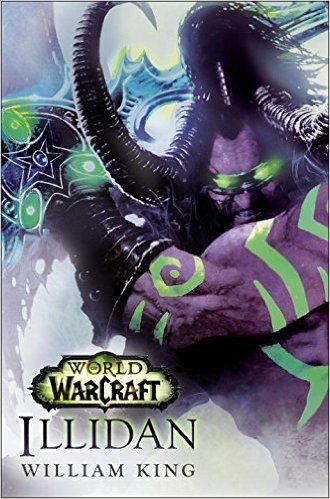
RETCON: THE BOOK. Okay, ignoring how I feel about this one from an: “Oh crap, we need to make Illidan a good guy now,” standpoint that definitely resonates strongly with its pages, Illidan is still an enjoyable read. Looking at the rise and fall of Illidan from the end of Warcraft 3 until his “death” at our hands within the Black Temple raid, the book focuses not only on Illidan but also his newly created Demon Hunters, detailing just what drives people to mutilate themselves in order to fight the Legion.
The book paces itself well and manages to be filled with enough interesting characters and insight to not just be a long and arduous checklist of why Illidan was actually good all along. It manages to move Illidan from the insane monster of the expansion to a more tragic and layered heroic villain who, while having the best intentions in mind, still manages to come across as a mad dictator crushing all who get in his way.
War Crimes by Christie Golden
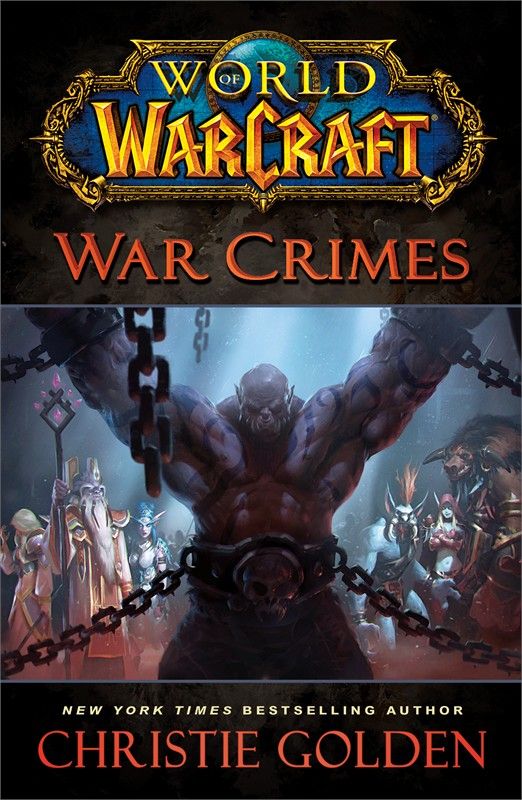
War Crimes is my personal favorite of these books. The seeming final book of the main canon written by Christie, it covers the trial of Garrosh Hellscream at the end of the Mists of Pandaria expansion and the lead up to the Warlords of Draenor. Acting as almost the greatest hits of past books and stories from the game itself, the book concerns itself with trying to answer whether Garrosh was a product of his own failings or that of the Horde and Alliance themselves.
The book is small in scale but big in scope, dealing with countless personal nuances as well as the greater sweeps of the nations of Azeroth. War Crimes manages to feel deeply personal while also remembering to give credence to the great scale and importance of the world events that have lead to what feels like the end of the first real era of the Warcraft books, with newer writers now taking over beginning with Illidan.
War Crimes is probably one of the two books I’d recommend above all others on this list, and one of the few even the most casual of fans should seek out.
Vol'jin: Shadows of the Horde by Michael Stackpole
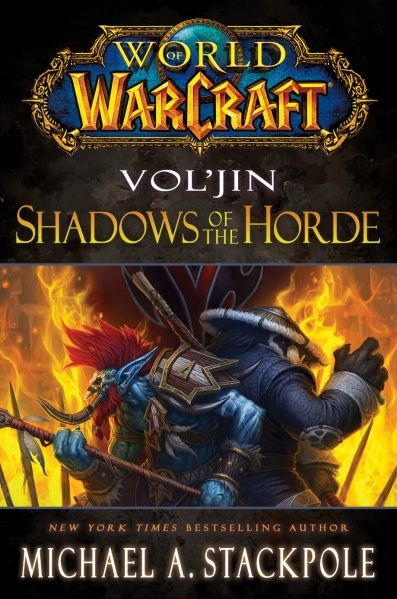
Vol’jin Shadows of the Horde is probably the smallest of the books in scope and scale, dealing as it does with two main environments and at most, 3-4 characters.
Dealing with the aftermath of Garrosh’s betrayal of Vol’jin and his recovery alongside a mysterious human hunter in the Shado-Pan Monastery, the book focuses on a much slower and deeper story of both the concept of true loyalty and patriotism, as well as dealing with the true cost of war both from the standpoint of the effects it has on the minds of the soldier and on the way of life for the peaceful people that have been shouldered with its burdens.
Shadows of the Horde is an amazing book as a WoW entry and a general fantasy novel, a character tour de force that combines the best of the slower but more compelling story style that made up the Pandaria campaign as well doing what best it can to shine more light on one of the best and, until this point, mostly skipped over characters. The best of the WoW books by far, I would highly recommend picking it up.